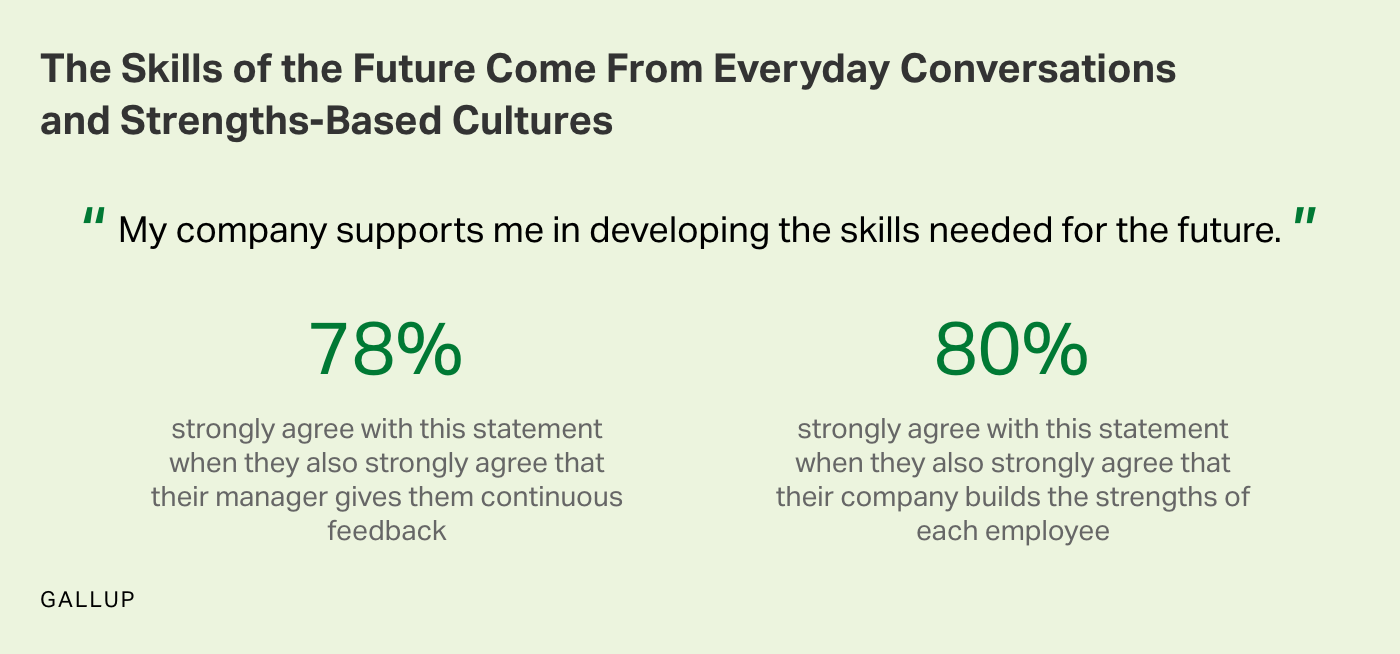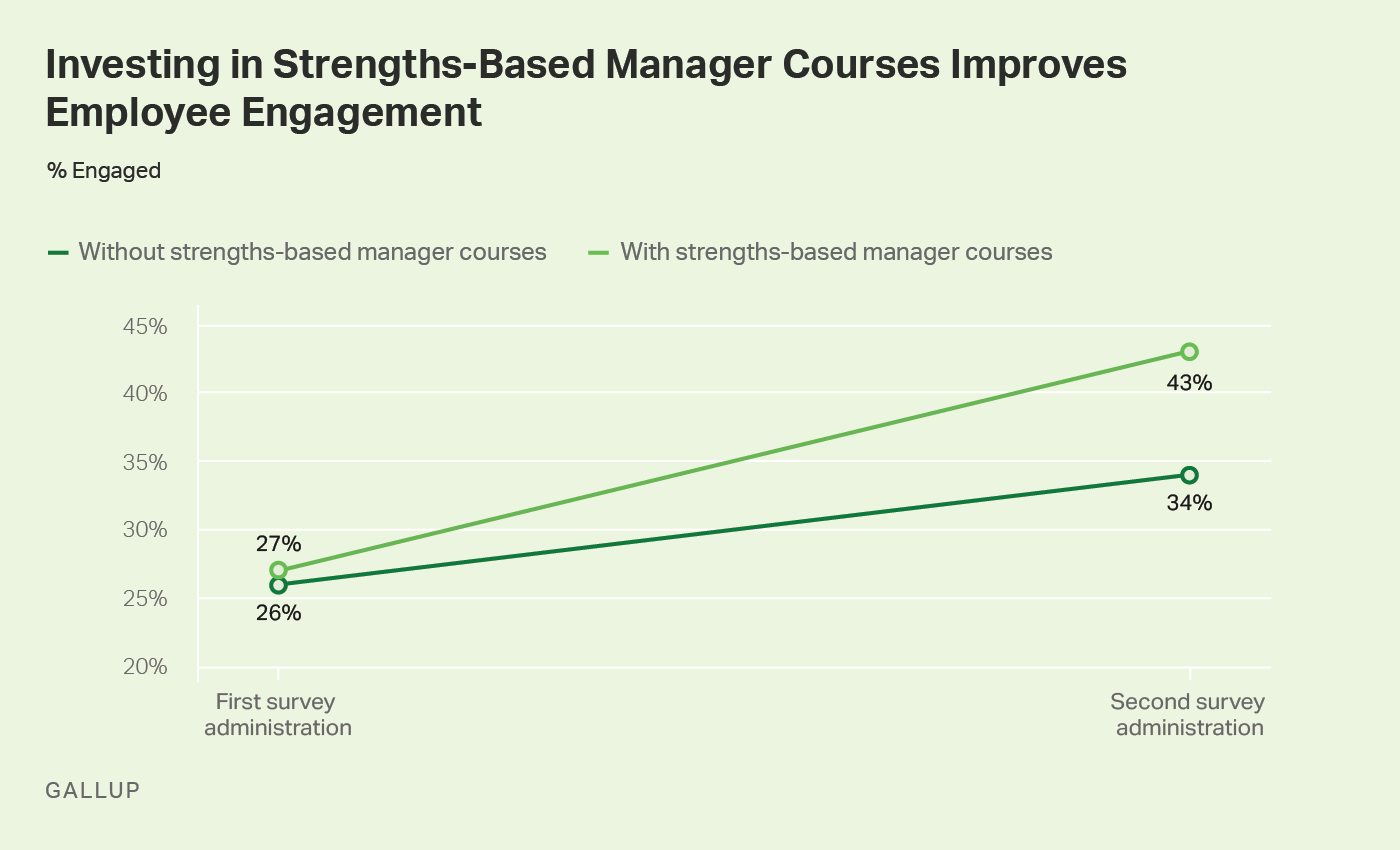Story Highlights
- Create the shift you need in HR by focusing on people, not just technology
- Start by building HR capabilities into your managers and leaders
- Build inspiring leadership with a crucial shift in organizational mindset
HR transformation is often about changing the way HR delivers its services. Search for "HR transformation" on the internet, and the majority of results will inevitably lead you to HR digital transformation. Technology is almost always at the center of transforming the way an organization experiences HR services. While that's not necessarily a bad thing, there needs to be a shift toward making people, not technology, the priority.
But there's a problem. On their path to improving their management approach, too many leaders and managers outsource the soft skills, people development efforts and cultural aspects of their role to HR technology and HR partners. Examples include:
- learning and development trainings that replace managers' role in developing their people
- upskilling and reskilling initiatives from learning platforms that replace managers preparing their people for the future
- selection assessments dictating hiring decisions that replace talented managers having a say in building their teams' HR business partners -- and that lead to generic feedback sessions instead of great leaders having authentic and open conversations with their teams
- wellbeing programs that replace managers and leaders taking a genuine interest in their employees' lives, inside and outside of work
As long as leaders and managers continue to outsource the soft skills of their job to HR technology and HR partners, they will miss the key experiences needed to become engaging executive leaders who know how to build successful high-development and high-performance cultures.
Real HR Transformation Is About Transforming HR
HR needs a different kind of transformation.
The real HR transformation should not be about changing technology -- it should be about changing HR. Rather than changing the way the business experiences HR, real HR transformation should be about transforming the role of HR in business.
Already, much of HR's role in some organizations is being placed in legal, IT and finance, while the remaining parts of HR are focused on being internal consultants to the business. HR transformations that restructure HR into centers of excellence reinforce this idea of HR partners being internal experts, consultants and advisers to the business.
HR needs to be integrated with business, and business needs to be integrated with HR. But is that all HR should be to the company? Consultants? Trainers? Advisers? Partners? Should they be more? The answer is yes! There is a missed opportunity for HR to change the way leaders lead and managers manage.
Do You Know Your Company's Current State of Executive Leadership and Management?
The state of leadership and management is broken, and HR transformation needs to be about building HR capabilities into managers and leaders. Some of this is already happening, but it needs to be accelerated with a stronger push if things are going to change in a meaningful way in the years to come.
Globally, just one in three employees strongly agree that they trust the leadership of their organization, and two-thirds believe there is widespread corruption in business. Among U.S. employees, 15% strongly agree that their leaders make them feel enthusiastic about the future, and 13% say the leadership of their organization communicates effectively. CEOs are leaving at record-high departure rates, and CEO tenure has dropped from eight years to five. Mergers and acquisitions fail to realize their intended benefits 70% to 90% of the time, with 47% of key employees leaving within one year of the transaction -- and 75% within three years.
Life expectancies of companies are dropping dramatically. About 50% of the S&P 500 could be replaced over the next 10 years, according to some studies. People are running from leaders as fast as they can, and there needs to be a revolution to turn them around.
Globally, just one in three employees strongly agree that they trust the leadership of their organization, and two-thirds believe there is widespread corruption in business.
When it comes to managers, only 35% are engaged at work. Employees worldwide are not inspired by the annual review conversations they're having with their manager (only 14% say they're inspired by their performance reviews). Employees in Europe and the U.S. say their organization isn't agile enough.
There needs to be a mindset shift in management -- a fundamental change to the philosophy of management.
Transform the HR Mindset, Career Paths and Training
Real HR transformation requires getting the cultural mindset shift right before making the necessary technological or structural changes.
For example, Gallup's Real Future of Work research on European employees reveals that mindset defines agility much more than team structure does. Make sure workers understand why your mission matters to them personally; currently, only four in 10 U.S. employees feel connected to the mission or purpose of their company. A 10% improvement in employees' connection with the mission or purpose of their organization would result in an 8.1% decrease in turnover and a 4.4% increase in profitability.
While leadership and management need a revolution, having HR double down on its strategy to consult and advise may not be the major course correction that businesses need.
HR needs to become an experience for business leaders, and the business needs to become an experience for HR leaders. HR leaders are positioned to increase human capital returns during a merger and acquisition, conquer agility by creating a culture of psychological safety, and build trust internally and externally. Change the path to CEO, CFO, COO and CHRO. Don't cut them from the same cloth, which has produced the current state of executive leadership.
For the largest companies, HR is getting more and more focused on workforce planning, including upskilling, reskilling, workforce reduction and future-of-work planning. To meet this growing demand, HR needs to transform from internal consultants to leaders of the business. That doesn't necessarily mean putting HR in charge tomorrow. It does mean putting HR into business leaders and managers today.
HR can provide a set of skills that business leaders and managers need to develop. CEOs should have HR capabilities, not just HR partners, just as much as they should have financial capabilities and not just financial partners.
How this development is provided needs to go beyond training from HR and into experiential training within HR. Gallup's research shows ethics training programs have limited impact.
Equally, upskilling and reskilling training does not increase training participants' confidence that the company is preparing them for the future nearly as much as creating an organization that is focused on building the strengths of each employee (nearly five times the impact of training) or managers who are great at providing ongoing feedback (twice the impact of training).

HR should provide training that teaches leaders and managers the soft skills that drive change, such as focusing on strengths, instilling purpose, building relationships, providing ongoing, meaningful feedback, and creating great team environments. Essentially, moving from boss to coach.
In a recent Gallup study, organizations that invested in learning programs using the concepts of strengths, engagement and ongoing performance development realized a 14-percentage-point increase, on average, in the proportion of employees who were engaged -- compared with an average increase of eight points in companies that did not invest in learning programs. Additionally, among 70 of the organizations included in the study, managers who received training on these soft skills experienced twice the productivity gains of those among managers who didn't participate in these strengths-based courses.

Training alone won't prepare your workforce for the future, but creating great managers will -- and that's where training should focus.
Take the Different Path in Leadership
To HR leaders: Lead the business as an HR leader rather than just leading HR programs. Do this by upskilling and reskilling the workforce with capable managers and not just capable curricula. Increase diversity in leadership by empowering leaders to individualize inclusion with strengths-based approaches, rather than only managing generalized stereotypes and demographics.
To business leaders: Lead HR as a business leader rather than outsourcing aspects of your leadership role to HR partners and HR technology. Remember, selection assessments exist to help managers make great decisions, not decide for them. Engagement surveys exist to empower ongoing coaching, not serve as an annual HR event.
Training alone won't prepare your workforce for the future, but creating great managers will -- and that's where training should focus.
Real transformation is about changing HR and not just HR technology. Prioritize people to change the way you lead and manage today.
Discover these resources to begin your real HR transformation today:
- Uncover Gallup's latest research, findings and best practices on what it takes to deliver high performance in today's changing workplace. Learn more about leading high-performance teams.
- Learn how to improve traditional performance management systems and why they are facing disruption. Download the report now.
- Discover how to find and hire the best person for the job.





